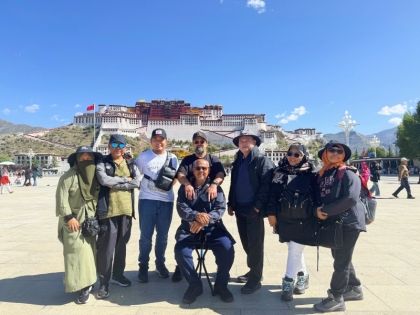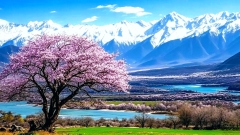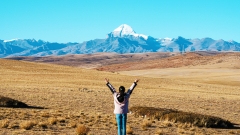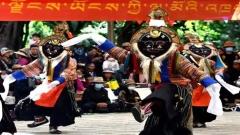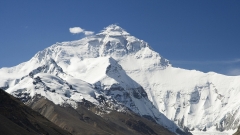Tibet is more than just breathtaking mountains and sacred monasteries — it is a land of deep-rooted spirituality, vibrant festivals, and unique customs that have shaped the Tibetan way of life for centuries. Understanding these cultural elements will not only enrich your travel experience but also help you connect more deeply with the Tibetan people.
1. Tibetan Buddhism: The Heart of Daily Life
Religion is the soul of Tibet. Tibetan Buddhism is not just a belief system; it influences every aspect of daily life — from how homes are built to how people greet each other. Monks in maroon robes, colorful prayer flags fluttering in the wind, and the soothing spin of prayer wheels are sights you’ll encounter everywhere.
Travelers are often fascinated by the spiritual devotion shown during pilgrimages, especially at sacred sites like Jokhang Temple or Mount Kailash, where locals perform full-body prostrations as an expression of faith.
2. Traditional Dress and Appearance
Tibetans proudly wear traditional clothes, especially during festivals or religious events. For men, this often means a long-sleeved chuba tied with a belt, while women might wear aprons with colorful stripes called pangden, indicating their marital status.
Ornaments made of turquoise, coral, and silver are popular, reflecting both beauty and spirituality.
3. Language and Communication
While Mandarin is spoken in urban areas, Tibetan remains the primary language throughout the plateau. Greeting someone with “Tashi Delek” (meaning “good luck” or “blessings”) is always appreiated and shows cultural respect.
Don’t be surprised if conversations are accompanied by lots of laughter — Tibetans are known for their warm, joyful nature.
4. Hospitality and Daily Life
Tibetan hospitality is legendary. If you’re invited into a local home, you’ll likely be offered a bowl of yak butter tea or tsampa (roasted barley flour mixed with tea). It’s polite to accept food or drink with both hands and to take at least a small sip or bite, even if the flavors are unfamiliar.
Most Tibetans live in family-based households, and their days revolve around farming, herding yaks, or running small businesses. Simplicity and spiritual mindfulness are key values in their lifestyle.
5. Unique Etiquette and Beliefs
Respect is vital in Tibetan society. Here are some etiquette tips to keep in mind:
-
Walk clockwise around monasteries, stupas, or sacred objects.
-
Never touch someone’s head — it’s considered the most sacred part of the body.
-
Remove hats when entering temples.
-
Always ask before taking photos of people, especially monks or religious ceremonies.
6. Colorful Festivals and Celebrations
Tibetan festivals are vibrant, spiritual, and deeply tied to the lunar calendar. Losar, the Tibetan New Year, is the biggest celebration, filled with dance, music, and offerings to deities. Other popular festivals include:
-
Saga Dawa: Commemorates Buddha’s birth, enlightenment, and death.
-
Shoton Festival: Features Tibetan opera and yogurt offerings to monks.
-
Nagqu Horse Racing Festival: A lively display of horsemanship and community pride in northern Tibet.
7. Art, Music, and Literature
Tibetan culture is rich in artistic expression. Intricate thangka paintings, handwoven carpets, and traditional woodcarvings can be found across the region. Tibetan music often features long horns, flutes, and chants, creating an otherworldly soundscape during religious ceremonies.
The Tibetan script, developed in the 7th century, is used in prayer scrolls and historical texts, preserving centuries of wisdom.
8. Modern Tibet: Culture Meets Change
While traditional culture remains strong, modern influences are also shaping Tibetan society. In cities like Lhasa and Shigatse, you’ll find young Tibetans blending tradition with modern fashion, technology, and global trends.
Still, the reverence for nature, spiritual life, and family remains the foundation of Tibetan identity.
Conclusion
Tibetan culture is a blend of resilience, faith, and tradition — deeply spiritual yet profoundly human. As a traveler, showing curiosity and respect will open doors to meaningful connections and unforgettable memories.
Recomend routes:
